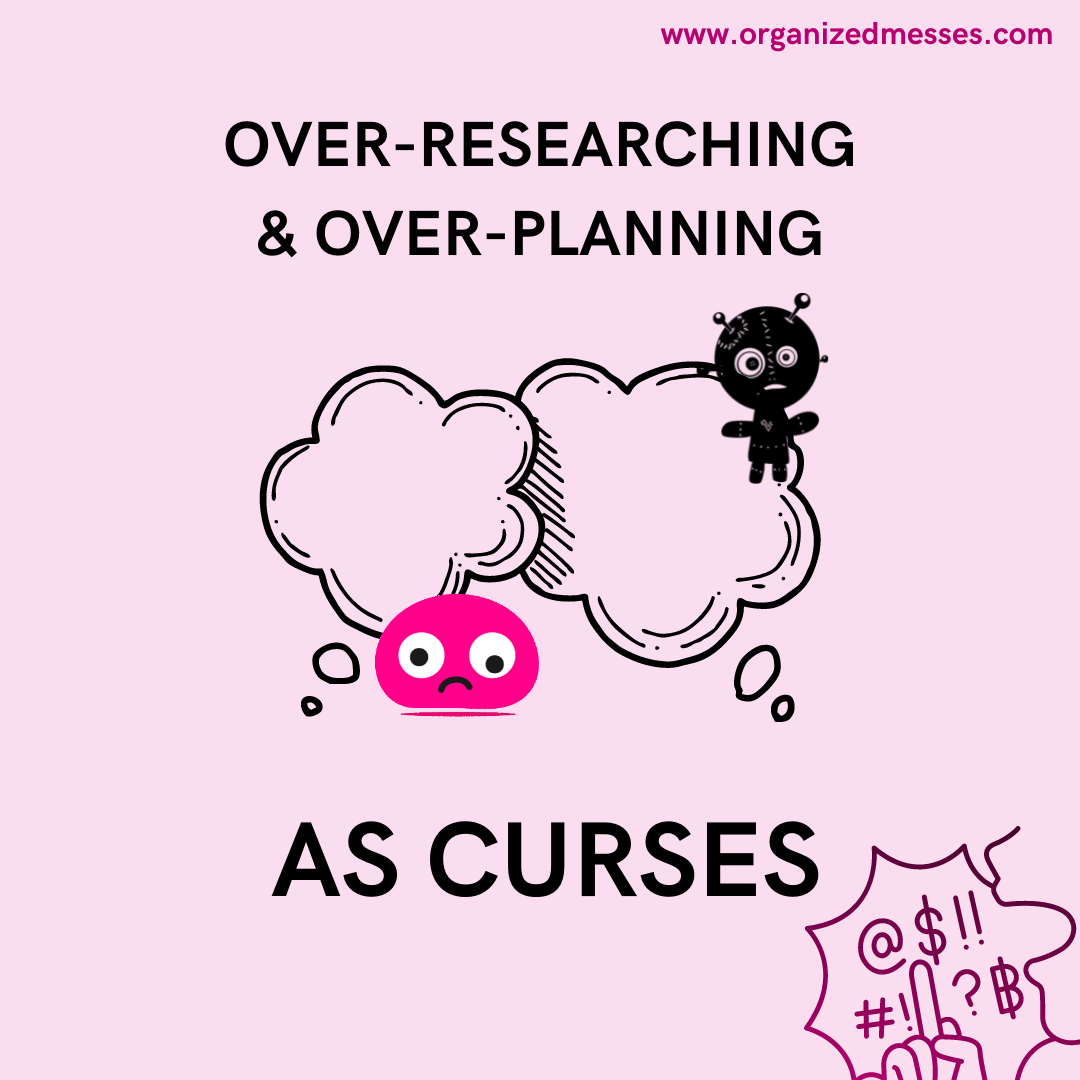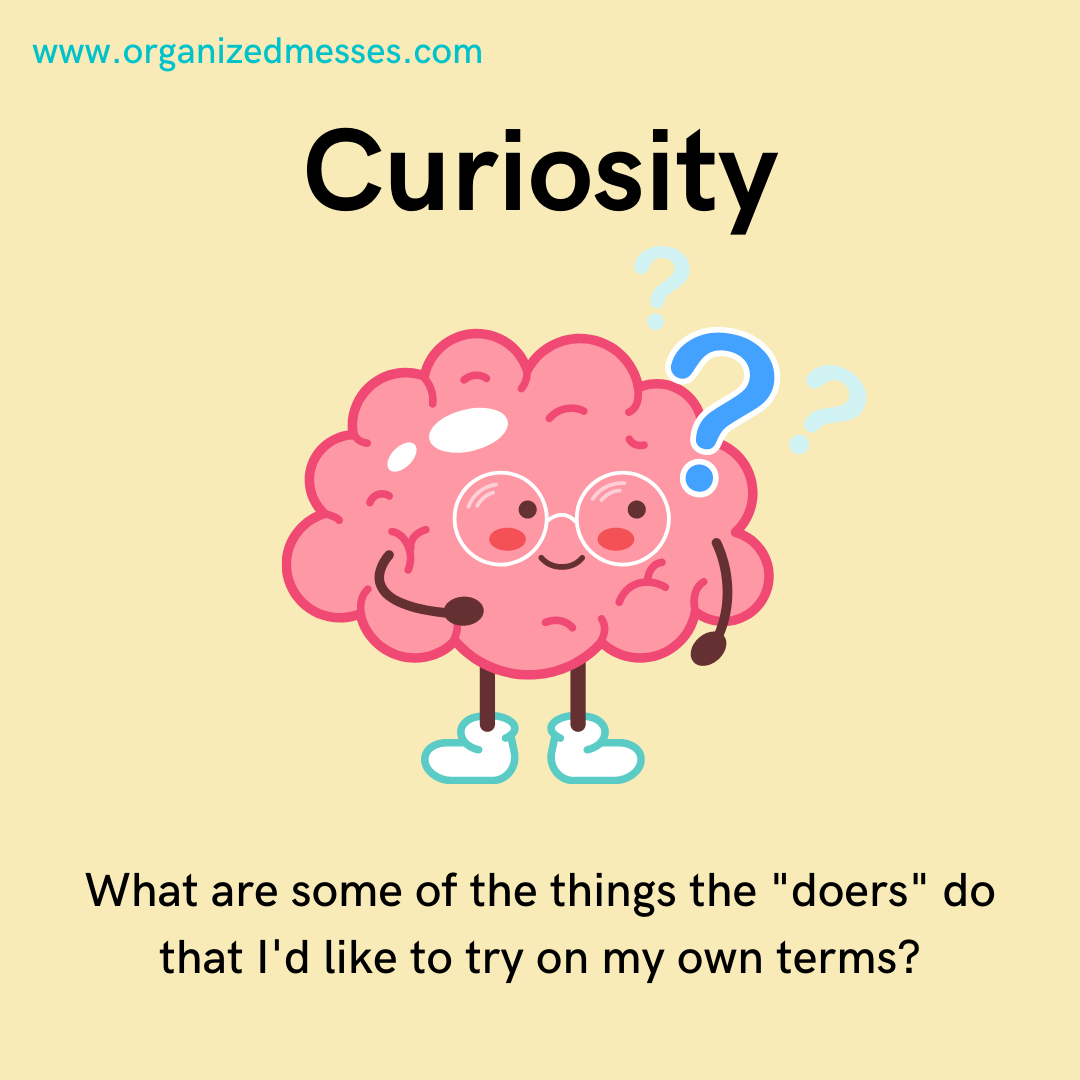Researching and Preparing as Gifts
These two acts can be a special interest, talent, and gift others pair with us.
When thinking about hobbies, areas of study, and anything we may be fascinated with, there tends to be an element of research and preparation that neurodivergent minds gravitate towards.
Light greenish blue background. Thought bubbles with a bow and gift box. Over-researching and over-planning as gifts.
It is a potential love language to share details and rabbit holes of research with those around us, or those we trust.
When comfortable, we can share stories, fun facts, and worlds of information about what we love with people we want to share that same love and fascination with. Is it a typical conversation? No, not really. It’s still a way to connect.
We can help and inspire others to think of things they don’t usually think about. This could come out in the way of, “I never thought of that.” or “Your conversation made me think of this.”
We can help reframe perspective and share the joy of learning, too. This can sometimes come out in the way of, “I don’t completely follow what you’re saying, but seeing you happy sharing makes me happy.” (This is the wish when we infodump)
Learning about the history, contexts, and WHY of a concept could be as important or more important than building anything.
We can impress people with our abilities to scour the internet, observe, or gather information through conversations. Putting the pieces together to form a story can be something we become skilled at. It can be a form of play to build mental maps of things we’re interested in.
In addition to building mental maps of the things we’re curious about, we can even start accumulating things in preparation for something related to the topic, things like hobbies or areas of study.
This experiential (and sometimes expensive or time-consuming) act of preparing, can make us very knowledgeable about the hows and whys within.
This ability to map out information can make us go-to consultants for people needing insights on something “missing” or a bird’s eye perspective on a concern. We can also help identify patterns that people share, and what seems to be out of place for potential problem solving.
Example: Taking up watercolor or drawing comics as a new hobby.
In order to research and prepare for this new endeavor, you might do the following:
Watch 150 YouTube videos on making art
Follow 200 IG and TikTok art influencers
Enroll in 3 art master classes online
Spend $400 on art supplies, including different types of paper, inks, markers, brushes, and paints
Order 10 books on the craft and nature of being an artist
Make an artist setup with inspiration to create
Pin thousands of images to your Pinterest board for inspiration and references
Go to the museum, galleries, several art walks, and zine fests
Add your thing here. We know there’s more lol (aka the ADHD tax)
You may start doodling and creating some artwork, but after a while…
You stopped creating. The hyper fixation is gone. You’re feeling unsure if this is worth it. There’s doubt and impending abandonment of the art supplies.
“It’s too difficult to keep this up. I feel like a failure. I might as well stop.”
So what happens? A few things. There are hibernations and abandoned projects, AND there’s this cyclical process of continuing to research and prepare. Why? Because there’s this underlying compulsion for perfection that sabotages any ability to try unless it’s “just right.”
Researching and Preparing as Curses
The shadow of being a thinker can show up in missing out on lived experiences that add nuance to the theory we’re so good at developing. There is safety in living in the realm of ideas and possibility. Here, you don’t get to disappoint yourself or others in the tangible world. In theory, you have a sense of control over the information and variables to look out for.
Pink background. Thought bubbles with sad faces and doll icon. Over-researching and over-planning as curses.
Even when rationalizing and having thought experiments can be such a joy, inspiration, and type of play, there are extreme ways of being that can make it difficult for us to be in a sense of flow in life.
Life is not all thinking and philosophizing. It’s also not all chasing adventures, eating all the things, and running marathons. Life is both.
When our default is to think and analyze, we’re very attuned to our heads and the planning parts of life.
This correlates with not being as attuned with our bodies, physical needs, or responses to the environment.
Thinking all the time can indirectly stop us from listening to hunger and thirst cues. Ever forget to eat or drink water?
We also may be more clumsy and bump into things, and get lost, EVEN THOUGH it’s supposedly a familiar environment or route. Doesn’t matter, bumped my head anyways.
Living so long in our heads can make it uncomfortable to constantly practice doing things to learn about our bodies, or practicing something as a beginner.
Because we’ve mastered the art of thinking, we can be more comfortable staying a master here.
People may have ridiculed us for not doing things easily. We may be judged or mocked for having a difficult time doing things other people do without needing a road map. There could be shame or embarrassment for having to learn things a “child should already know.”
We can also be met with disbelief—people say we’re exaggerating hardships or reject our experiences. :(
People can’t reject or judge you inside your head. There are potential internal and external obstacles to learning how to live in our bodies and the outside world.
Light purple background. World emoji smiling with pink hearts. Living in a world of and.
Cultivating Compassion & Redefining Who You Are
The larger culture has implicit messages of how to be, including how much thinking and doing a person “should” do. We can internalize these messages and be treated like there’s something wrong with us because we act differently. The frustrating and painful thing is the archetypes and stories of the thinker, planner, and philosopher are used in entertainment often. The fictional thinker is celebrated and mysterious, a muse to inspire. But real-life thinkers and rationals are mistreated for living our authentic paths, or paths we’ve created to protect ourselves from judgment and rejection.
Living in a world of AND can help us become self-compassionate with our journeys of self-discovery and growth
We don’t have to be perfect, AND we started off with certain messages of needing to be experts at the things we do.
Life is an adventure, AND we can try things for the sake of having experiences NOT mastery.
Accepting that your default is to be cerebral AND you can practice listening to your body more can help build momentum toward changes that YOU want to do.
You can pick what works for you now AND get rid of harmful practices that are unkind, sabotaging, or inauthentic.
You have a gift for thinking AND can redefine how you want to do things to have more experiences in life.
You can acknowledge that change is difficult AND figure out smaller and safe ways to try new things without feeling overwhelmed by perfection.
You can practice affirmations and saying kind things to yourself (even when you think it’s cheesy), AND have faith that being kind to yourself will help with going on another cycle of change.
You can observe the “doers” and see what you’d like to try. Be curious about how you can do something like them, but on your terms.
light yellow background. Pink brain with glasses and question marks smiling. Caption states: what are some of the things the doers do that I’d like to try on my own terms?
Leading with Curiosity
Leading with Curiosity. A light green square with a dark brown bear. The bear has a thought cloud with a question mark. There are fruits beside text. The text is describe din detail below.
What are the strengths people think I have?
It’s something we forget when we are overwhelmed and feel hopeless. We can forget the people who know us the most can also be the ones who can help uplift us.
Find and seek out people who can remind you what your strengths are.
Ask for 3 to 5 strengths, and if they can be specific with when they saw you with the strength.
Is there a skill I want to try that people I admire do well?
Follow your heroes and fandoms!
What’s something you admire about their ability to do something?
If you can’t identify it, follow their journeys. Try and map out the moments that stand out most to you.
How can I modify the new skill to make it MINE?
After we have heroes and references for skills and the possibility for change, the next step is to think about how to make it yours.
It can be modified with smaller steps, using different tools.
The skill itself can change for a different part of your life, or concern.
Am I open to trying something new as an EXPERIMENT?
It’s easier to try stuff when it’s an experiment. We’re just gathering data, something you’re naturally inclined to do anyways. This time the data is about you and using different skills.
Experiments are safe because there’s no commitment to stick to it forever. You have to pause after a period of time to analyze the results.
How will I know a new skill is working?
This could be an inner feeling. Something FEELS different.
It could also be something tangible and measurable. What small measurements and things can you identify to see that change happened?
Was it a change that you like and want to keep? Or is it a change that you’re not sure about? Take note of it.
Journaling or documenting your responses to these small changes can help you see if you want to continue with the new skills.
Change is about acceptance, practice, and being kind to yourself.
Acceptance includes seeing your strengths in a world that is forever trying to change you into something you’re not. Practice includes the smallest steps with REST across the lifespan. Being kind to yourself includes seeing yourself as worthy along each part of your life, whether you "accomplish” tasks or not. You’re wonderfully you because you exist~!












